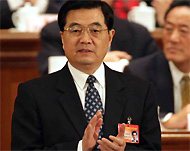Japan’s Abe meets China’s leaders
Shinzo Abe, the Japanese prime minister, has met China’s president and prime minister in Beijing in an attempt to mend ties between the two Asian giants, and also to discuss concerns over North Korea’s nuclear threat.

On Sunday, Abe, making his first overseas trip since taking office on September 26, held 80 minutes of talks with Hu Jintao, China’s president, and a 90-minute meeting with Wen Jiabao, China’s premier.
A statement released by both sides said Abe had invited China’s leaders to Japan, and that the invitation had been accepted.
The communique said: “The Japanese side invited the leaders of China to Japan. The Chinese side expressed gratitude for the invitation and agreed on that in general.”
Abe flies to Seoul on Monday for talks with Roh Moo-hyun, the South Korean president.
Opportunity
Beijing and Seoul had refused to meet Junichiro Koizumi, Abe’s predecessor, because of his pilgrimages to Tokyo‘s Yasukuni shrine, seen by critics as glorifying Japan‘s past militarism.
“The change of government gives an opportunity for both sides to build a new relationship regardless of what has happened up to now,” an aide to Abe said in Beijing before the meeting.
|
“The change of government gives an opportunity for both sides to build a new relationship regardless of what has happened up to now” An aide to the Japanese Prime Minister Shinzo Abe |
Abe, 52, is the first Japanese prime minister born after World War II, and is a conservative who wants to restore Japan‘s sense of national pride. He has defended Koizumi’s visits to Yasukuni.
Abe has also paid his respects there in the past, and has declined to say whether he will do so again while in office.
Mending ties would make it easier for the three countries to address North Korea‘s announcement that it plans to conduct a nuclear test, an issue certain to be high on the agenda at the two summits.
US officials have said that the reclusive state could detonate a device as early as this weekend, possibly on Sunday, the anniversary of North Korean leader Kim Jong-il’s appointment as head of the national defence commission in 1997.
Rewards and risks
Abe has laid the groundwork for the summits by softening his public statements on history, although experts warn that the diplomacy can backfire in Beijing and Seoul if he later visits Yasukuni.
No one expects the meetings to erase bitter memories of Japan‘s wartime aggression and colonisation, end mutual mistrust, or settle disputes over territory and energy rights.
But Abe is hoping that his summits will win praise from mainstream voters at home, and ease concerns in Washington and elsewhere about regional tensions.
Shi Yinhong, an international relations expert at the People’s University of China in Beijing, said: “Relations are in such a poor state, and Abe wants to score a big diplomatic success to show his new cabinet’s strength to the Japanese public.”
Economic fallout
Businessmen worried about economic fallout from poor diplomatic ties have pressed Abe to improve relations with Japan’s neighbours.
China and South Korea are also keen for better relations with Japan given their vital trade and investment links.
 |
|
Despite domestic engagements, |
In a sign of Beijing‘s eagerness for rapprochement, its leaders met Abe despite Sunday’s opening of a key gathering of senior Communist party officials.
Abe, Hu and Roh are expected to urge North Korea not to carry out a nuclear test, but behind the scenes they could well differ over how to persuade Pyongyang to hold back.
Japan and the US prefer a hard line that would include tightening sanctions in the event of a test, while South Korea and China lean towards negotiation and incentives.